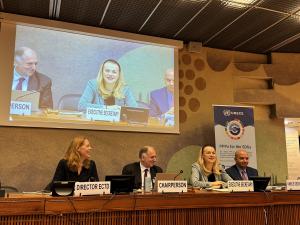Infrastructure is crucial for social and economic development. To achieve the 2030 Agenda for Sustainable Development, infrastructure needs to be green, climate resilient, circular, inclusive and fiscally sustainable, with people as the main beneficiaries. Infrastructure is also needed to rebuild communities ravaged by natural disasters and armed conflicts, without compromising the broader goal of sustainable development.
The world is facing unprecedented challenges in achieving the SDGs by 2030. 2023 is set to be the warmest year on record and greenhouse gas levels continue to increase. The increase in man-made and natural disasters has exacerbated the existing sustainable development challenges. The persistent inequalities and gaps in access to and benefits from infrastructure services have also hindered the progress towards the SDGs.
There is therefore an urgent need to harness Public-Private Partnership (PPP) for delivering infrastructure projects that contribute to the SDGs, and that effectively accelerate economic, social, and environmental development in the UNECE region and beyond. This includes PPP and infrastructure projects that could play a vital role in the post-disaster and post-conflict reconstruction phase (e.g. providing essential services, creating jobs, and re-boosting the economy).
In her opening remarks at the 7th session of the UNECE Working Party on Public-Private Partnerships, UNECE Executive Secretary Tatiana Molcean called on member States to front-load PPP and infrastructure projects in post-disaster and post-conflict contexts, by streamlining them – without compromising the broader goal of rebuilding economies and societies in line with the SDGs.
At the session, member States discussed how the UNECE PPPs for the SDGs approach can help to achieve this specific goal. Among others, UNECE member States endorsed the Guidelines on delivering Public-Private Partnerships projects for sustainable economic recovery and reconstruction in support of the Sustainable Development Goals which includes very practical policy recommendations for policy makers on how PPP projects can be accelerated in the reconstruction phase in post-disaster and post-war contexts.
In addition, member States identified four new policy documents to be developed by the Working Party to further develop the UNECE PPPs for the SDGs approach, in the following priority areas:
- Enhancing stakeholder engagement throughout the PPP project lifecycle in support of the SDGs;
- Promoting gender equality and women’s empowerment through PPPs for the SDGs;
- PPPs in off-grid renewable energy; and
- Small-scale PPPs.
These priority areas will be further explored at the 8th edition of the UNECE International PPP Forum in Istanbul, Türkiye, from 8 to 10 May 2024, which will be organized with the support of the Government of Türkiye.
For further information, please visit: https://unece.org/ppp
